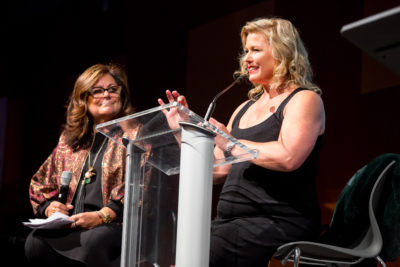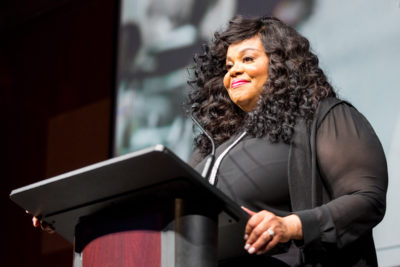Diversity and inclusiveness are a part of FIT’s mission. What follows is the second of a three-part series covering events at FIT—a panel titled Inclusive Beauty with BuzzFeed, the Jay and Patty Baker School of Business and Technology’s Dean’s Forum called The Business of Curves, and, finally, the opening, in December, of The Body: Fashion and Physique at The Museum at FIT. Each installment of the series will comprise a Q&A with the moderator, the participants, or, in the case of the exhibition, the curator.
On Wednesday, November 15, the Jay and Patty Baker School of Business and Technology Dean’s Forum presented The Business of Curves: Fashion’s Future, featuring industry pioneers and visionaries Emme, Susan Moses, and Catherine Schuller. Fern Mallis, creator of New York Fashion Week, moderated the presentation and question-and-answer session. The event highlighted the extraordinary growth and expansion of the plus-size fashion marketplace and introduced and encourage Business and Technology students to think about the business of design with integrity and high style for all women.

Emme, known as the first plus-size supermodel, is a five-time author, former television show host, andfounder of Fashion Without Limits, a design initiative promoting the creation of size 12 and up designs. Celebrity stylist Susan Moses is the author of The Art of Dressing Curves, touted as the plus-size fashion bible by InStyle magazine. Catherine Schuller is a former model, image consultant, curator of Runway the Real Way, a monthly, diverse fashion event; and an instructor for FIT’s petites and plus-size continuing education studies.
What follows are excerpted questions and answers from the presentation. For the full program, watch the video archive by clicking here.
Fern Mallis: It’s such an exciting time right now. The strides of many of the runways throughout the world in the last year have been remarkable. How do you define plus size woman? Garment size, body size or both?
Susan Moses: The plus size woman is…usually a fuller, curvier woman so it’s definitely defined by her size and body type, by her curves. We’ve had a lot of back and forth about the term plus size. Is it a negative? Is it a positive? Should we use it should we not use it? I’ve always felt that, first of all, the term, plus is a positive. It means a little bit more, and you can’t go wrong with a little bit more. A little bit more to love, a little bit more to hold onto, and a lot of women have found camaraderie in the plus community.

Some of the models say they don’t like the term and I understand them, as well, because when you’re moving in certain realms of the industry in which it’s still frowned upon. There’s a negativity, a stigma attached to it. But in actuality there’s nothing negative about it, and being in the industry for so long I know it’s really a garmental term…it’s like Contemporary, Missy, Petite. Is it an insult to use it in a search engine? When I’m shopping I don’t have time to go through a whole site to see if they have my size, so if I can find “curves” or “plus size,” I can go right to it. And that’s how a lot of women feel. But at the end of the day there’s nothing negative about it. It’s going to be around for a while.
FM: How can we move away from negative stereotypes associated with the term plus size?
Catherine Schuller: Curvy is always wonderful. The curvy woman needs to be a diva about her curves. Dress for who you are and what you want…it’s really about owning what your style is…style is being yourself on purpose. And never leave the house without a smile and also without a fabulous-looking outfit. The world judges us much harsher. I don’t want the world to harshly judge us for not rocking it all the time.
Emme: We need the higher level plus size images. Haute. So we can understand what to put with the tops and the bottoms and how to accessorize. When we don’t have our own industry being reflected back to us, whether it’s the color of our skin or our body shape, when you don’t see that, I need to look at a big poster and say, ‘I’ll get that.’ That helps me.
FM: What are the most dominant misconceptions within the fashion industry regarding the passions and desires of curvy women?
Emme: That women don’t have money to spend. But they would spend 88 percent more if they could buy into contemporary fashion…
CS: That we don’t like fashion. That we’ve given up and we don’t care about fashion…that we don’t want to look good or we would have lost weight, and that couldn’t be further from the truth.
FM: Plus-size fashion is clearly not going away…
Emme: We need to get you internships in market and jobs in market. One way of ensuring employment for the students is to encourage them to take more technical design, take the illustration class with diversified bodies so you understand proportions. Nothing is better than a well-made garment.
CS: It’s about proportion, shape and silhouette, and figure type, and about grading. You don’t just take a pattern and size it up from a size 2 to a 22. You have to understand that we don’t get larger all over. Just because we’re larger…our armhole isn’t larger. Those are very key issues that as the body grows, learn how the body grows. It’s a fascinating field, and it really can be done well. Do not fear the full-figured woman. She is the most loyal customer. She will be there for you every time. And if you satisfy her, then you have 67 percent of the population.
Emme: If there’s a window of opportunity, we encourage you to be a future for our business, and there’s not going to be the mistakes in market if you learn how to do it here.
FM: What campaigns of late have empowered, elevated, and inspired you?
SM: Lane Bryant. My grandmother was 6 feet tall so she used to shop in their tall department, and my mother has an obsession with lingerie. It’s a legacy brand so it’s really been an honor to work with them. I’m a big fan of their campaigns, and I think they’ve done a wonderful job at really promoting positivity, self-love, normalcy, not air-brushing photos.
Emme: And Ashley Graham, for the first time in a commercial [Lane Bryant]. It was a big sigh of like, ‘oh yes, this is unbelievable.’
SM: There are lot of brands that are really doing a phenomenal job—quality, beautiful, and you know you’re going to find something for whatever occasion you’re looking for. That’s really exciting.
